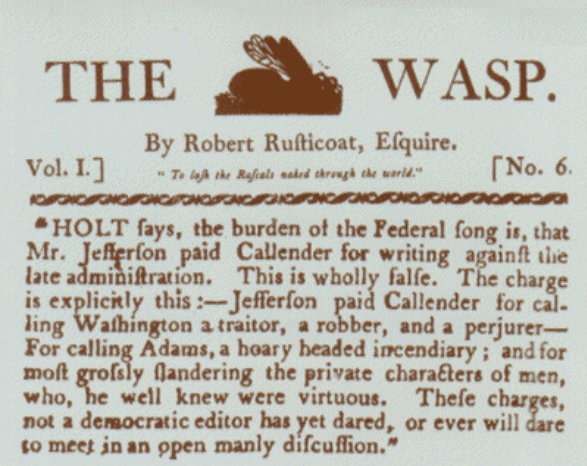3 Johns. Cas. 337 (N.Y. 1804)
Truth as a Defense in a Libel Action
In The Founders’ Constitution, an anthology of writings (letters, records of debates and early cases) relating to the Federal Constitution, Justice Kent’s opinion in People v. Croswell is included as Document 28 of the materials underlying the First Amendment.
President Thomas Jefferson, frustrated by anti-administration articles in Federalist newspapers in 1803, encouraged State Republican administrations to enforce the Sedition Act. The Wasp, a small Federalist newspaper published in Hudson, New York by Harry Croswell, published a story claiming that President Jefferson had paid publisher James Callender to run negative stories against his opponents. New York Attorney General Ambrose Spencer, who himself had been the target of one of Croswell’s attacks, immediately went before Columbia County grand jury and obtained an indictment on charges of criminal libel and sedition against Croswell.
The trial began in July of that year in the Court of Sessions in Columbia County with Chief Justice Morgan Lewis presiding. The State was represented by Attorney General Ambrose Spencer and the defense by William Peter Van Ness. Van Ness sought to introduce evidence of the truth of the published statements, but Justice Lewis instead instructed the jury to consider only the question of whether or not there was evidence beyond reasonable doubt that Croswell had published the statements. The jury found Croswell guilty.
Alexander Hamilton who, due to pressure of work had been unable to represent Croswell at trial, brought the matter before the New York Supreme Court of Judicature on a writ of certiorari. The public, recognizing the importance of the case, packed the courtroom. Hamilton, in a six-hour closing argument, passionately advocated for freedom of the press, stating that the right of giving the truth in evidence, in cases of libels, is all-important to the liberties of the people. Truth is an ingredient in the eternal order of things, in judging of the quality of acts. Justice James Kent wrote an opinion adopting Hamilton’s reasoning in which Justice Smith Thompson concurred. Chief Justice Lewis wrote an opinion upholding the long established precedent in libel cases that rendered truth irrelevant and Justice Brockholst Livingston concurred in this decision. The Court was deadlocked because the “fifth” judge, Ambrose Spencer, had deferred his judicial appointment to the New York Supreme Court of Judicature during its pendency of this case so that he could continue to represent the People. In these circumstances, the prosecutor was entitled to move for judgment on the verdict, but the motion was not made.
On April 6, 1805, the New York State Legislature enacted L. 1805, ch 90, providing that truth was a defense to a libel charge “where published with good motive and for justifiable ends.” Sixteen years later, this principle was enshrined in New York’s second Constitution, adopted in 1821.
People v. Croswell: Alexander Hamilton and the Transformation of the Common Law of Libel
by Paul McGrath
Judicial Notice Issue 7

